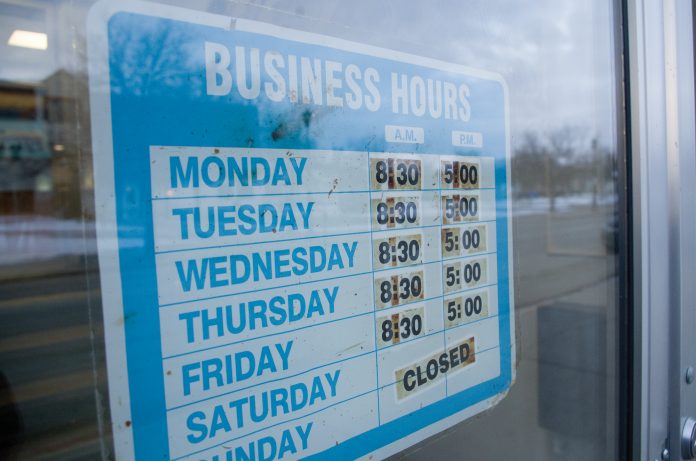Thousands of jobs could be lost in Saskatchewan and across Canada as small businesses continue to face obstacles due to the COVID-19 pandemic, new data from the Canadian Federation of Independent Business (CFIB) shows.
According to data from the advocacy group’s latest small business survey, about 17 per cent of Saskatchewan small business owners are “seriously contemplating” closing their business. That would put about 89,000 jobs at risk province-wide.
Nationally, one-in-six small business owners are seriously contemplating permanently closing, which would put about 20 per cent of private-sector jobs at risk. That’s on top of the 58,000 businesses that closed in 2020.
Projections from CFIB range nationally from 71,000 to 222,000 businesses closed. The CFIB is reporting its mid-range projection of 181,000.
Provincial, the low estimate is 2,858, mid-range estimate is 6,483 businesses and the high estimate sits at 7,891.
The results are based on projections from a 2021 controlled-access online survey. A probability sample with the same number of respondents would have a margin of error of plus or minus 1.5 per cent, 19 times out of 20.
The hospitality sector has been the hardest hit, with 34 per cent of businesses surveyed responding that they “strongly agreed” or “somewhat agreed” that they were actively considering bankruptcy or winding down their business as a result of COVID-19.
Arts, recreation and information businesses and transportation companies also saw over ten per cent of respondents answer that they strongly agree with that statement.
In Saskatchewan, 76 per cent of businesses are fully open, 49 per cent are fully staffed and 27 per cent are making normal sales. That data is better than the federal averages, which show just 47 per cent of businesses fully open, 36 per cent fully staffed and 22 per cent making normal sales.
The percentage of Saskatchewan businesses fully open and fully staffed is up from the November survey, but the per cent making normal sales has fallen.
CFIB vice-president Western Canada and Agri-businesses Marilyn Braun-Pollon said the data shows that 2021 hasn’t been any kinder to the business community.
“I think after the tough financial and emotional slog to get through the historically difficult year that was 2020, the beginning of 2021 does feel more like the fifth quarter of 2020 than a new year,” she said.
“Unfortunately, the numbers paint a pretty grim picture. I hope the numbers turn out to be wrong and we don’t have as many businesses looking to permanently close and wind down. It just tells us and shows us that it’s an extremely difficult time.”
Braun-Pollon stressed that these aren’t just numbers.
“They’re business owners that have their house on the line,” she said. “They’re employing friends, family or neighbours. These are the livelihoods that could be impacted in communities across the province.”
The data, she said, emphasizes the need to support local businesses
“It’s more important than ever, she said.
“We need to think small business every day in all of our purchases to help these businesses survive in 2021.”
Most importantly, she said, the data drives home the point that all Saskatchewan residents bear a responsibility to carefully follow public health guidelines to limit the spread of COVID-19 while allowing businesses to operate safely at limited capacities. She also called on provincial support programs, such as the Saskatchewan small business emergency payment, to be renewed.
“Ther is a lot at stake here. That’s why we believe residents all have a role to play to keep the number of cases low. The majority of businesses are working hard to keep their staff and customers safe,” Braun-Pollon said.
“It’s critical residents follow the rules to ensure we don’t need to introduce additional restrictions in the coming weeks.”
The province hasn’t ruled out toughening restrictions. While the new daily active case count has been trending downward over the past few days, falling to 286 Thursday, Chief Medical Health Officer Dr. Saqib Shahab said Tuesday that the health care system remains under pressure and if those strains aren’t relieved soon, the province would have to get even tougher to prevent a situation where an overburdened system is forced to choose who gets care and who doesn’t.
Premier Scott Moe projected confidence Tuesday, citing the falling numbers of daily new case counts, but did muse about taking stronger action against the small number of businesses and residents who continue to ignore public health orders.
Moe threatened stronger fines and even shutdowns for businesses that choose to not abide by public health orders. His words came after a video posted to social media showed maskless dancing in a bar in Regina.
The seven-day average of daily new cases was 286 Thursday, down from a peak of 317. Still, it’s far above the targets of 60-120 per day.
Saskatchewan also continues to lead the country in terms of active COVID-19 cases per capita.
Braun-Pollon said there needs to be consequences for the ones who are not following public health guidelines and are contributing to the virus’ spread.
“If the businesses and residents are intentionally not following the rules, there should be consequences. The fine needs to reflect what the infraction is,” she said.
The vast majority are working hard to follow those guidelines. There does need to be consequences for non-compliance. It is disappointing that there are a few businesses and residents ruining it for the majority. We need to make sure there are consequences for those not following the rules. That’s the sentiment I get from business owners we talk to.”


